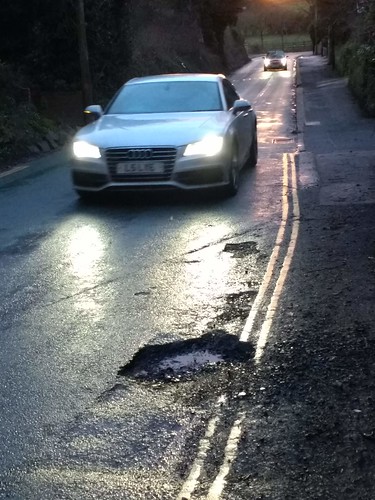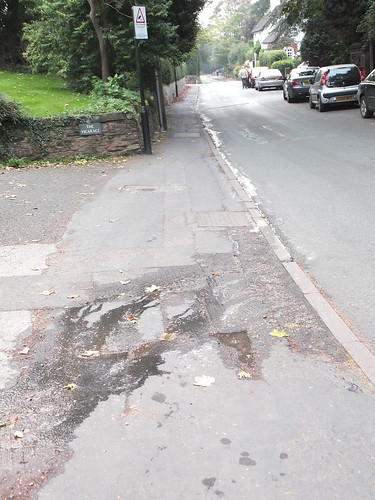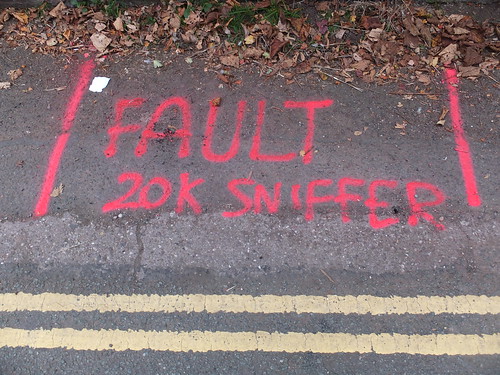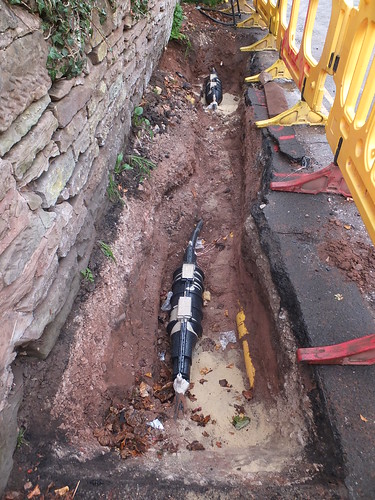'Patching' is rather temporary. Over a few years, the area of road surface shown above has suffered a number of separate potholes and the picture below (apologies for the poor quality) reveals at least five separate, overlapping attempts at making good in this small areas.
Overlapping pothole patching in Sandy Lane in November 2019
Water in the left gutter from a burst main further up in Sandy Lane gets diverted by the camber to the right and then back to the left (Brewood Village)
To assist in shedding rain water, road surfaces are supposed to be cambered from side to side so as to direct surface water to the nearest gutter. At frequent intervals, this water should be directed underground into a surface water sewer pipe. Water enters the sewer via a series of gullies each provided with a hinged drain cover at road level, usually made of cast iron or cast steel.
This cover has a series of slots to admit water which passes into the sewer pipe via a U-trap, a larger version of the trap fitted under domestic sinks. The idea is to prevent solid material from being swept into the sewer but instead being retained in a chamber in the gulley, below the level of outflow to the sewer pipe. This should avoid blockages in the sewer pipe but over time sediment builds up, necessitating periodic removal before the gulley becomes blocked.
This is achieved by a sort of 'wet-n-dry' vacuum cleaner called a Gulley Emptying Vehicle. These vehicles usually also provide road-sweeping facilities, using contra-rotating brushes to remove debris and mud from the gutter and road surface.
A modern Gully-Emptying Vehicle parked in Sparrows End Lane in 2016
Unfortunately, during the period of Government Austerity the United Kingdom has endured since 2008, gulley emptying seems to be low priority around here and many gullies have become blocked and ineffective.
In the post Infrastructure Problems, I outlined how mains water is normally a buried service. Until isolated or repaired, bursts or leaks on this network can result in the discharge of large volumes of water which either enter the surface water sewer via the gullies or generally saturate the surrounding earth.
One example occurred, again in Sandy Lane, in 2013. A leaking buried water main announced itself by water flowing across the pavement and into the gutter. For some unknown reason (perhaps because it appeared to be a relatively minor leak) the water authority chose to defer repairs.
Sandy Lane. Water still leaking in October 2013.
It was October when the electricity suddenly failed. A quick look outside revealed that most (not all) of the village was in darkness so I didn't bother to check the house fuseboards. Power failure was not unknown at the time as the village has various overhead transmission lines which were prone to occasional failure, particularly during thunderstorms or bad weather. I can't remember how long it was before supply was restored but the electricity authority must have arranged some temporary 'workaround', because it was some days before permanent repairs were effected and the likely cause was revealed.
I found that they had located a cable fault underneath the road surface of Sandy Lane, a little downhill from the long-standing water leak and emblazoned the position with red spraypaint. A few days later the water leak was repaired and the electricity authority had dug a trench to locate the cable problem, which appeared to be the remains of a straight cable joint, blown apart and blackened. The conclusion seemed irresistible that the continuous saturation by water from the unrepaired leak has caused the elderly joint to fail.
The electricity fault has been located in October 2013.
The repair to be cable was effected out the damaged cable joint and the cable on either side for a short distance and splicing in a length of new cable using two modern epoxy-filled joints.
The damaged section of electricity cable has been cut out
and a new section 'spliced in' between two modern epoxy-filled joints.
Just some of the pitfalls of living in a modern society!
Pictures around Brewood Village
The following album includes some examples of local services infrastructure:-
Brewood Village







